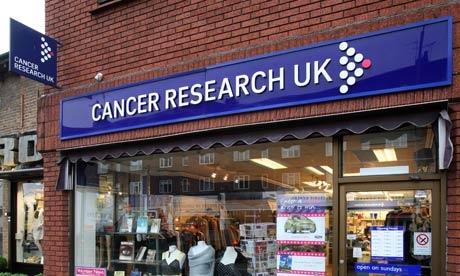
Scientists genetically map the disease which should lead to more accurate diagnoses and better-targeted treatment
 |
Scientists genetically map the disease which should lead to more accurate diagnoses and better-targeted treatment.
The treatment of breast cancer could be revolutionised with patients offered more accurate diagnoses and better-targeted treatments after a study in which scientists genetically mapped the disease.
The research found that rather than being a single disease, breast cancer can be classified into 10 distinct types. It also identified several new genes that determine the aggressiveness of the cancer.
The breakthrough had been hailed by charities as a step towards the "holy grail" of tailoring treatments to the needs of individual patients.
The findings of the research, in which scientists examined 2,000 tumours in the largest ever genetic study of breast cancer tissue, could help predict patients' chances of survival more accurately and lead to the development of more effective drugs for each cancer type.
The research by Cancer Research UK scientists, published in science journal Nature on Wednesday, will not have an immediate impact on sufferers.
Dr Harpal Kumar, chief executive of Cancer Research UK, said: "This is a landmark study that really changes the way we think about breast cancer – no longer as one disease but actually as 10 quite distinct diseases, dependent on which genes are switched on and which ones aren't for an individual woman.
"What this research will help us to do is make a much more accurate, much more precise, diagnosis for every patient with breast cancer in the future.
"That will enable us to make sure that we really target the right treatment to the right woman based on those who are going to benefit, or if they're not going to benefit, not exposing them to the side-effects associated with those treatments.
"That will enable us to make much more progress in breast cancer in coming years."
Lead researcher Professor Carlos Caldas, at the charity's Cambridge Research Institute, said: "We have a completely new way of looking at breast cancer. It's not going to change the outcome for patients treated in the NHS tomorrow. But it will change the way we do clinical trials with new avenues to develop targeted treatments."
Caldas said the findings have helped scientists to understand why some women with breast cancer have a much better prognosis than others, but cautioned that more research would be needed. "This is a first, very important step."
He added that scientists now understood what tumours look like at a molecular level and will eventually know which drugs each of the 10 cancer subtypes will best respond to.
"We need to carry out more research in the laboratory and in patients to confirm the most effective treatment plan for each of the 10 types of breast cancer."
Previously breast cancer had been classified into four subgroups, depending on what they look like under the microscope and on tests for positive or negative "markers" on the tumours. Those with oestrogen receptors should respond to hormone therapies such as tamoxifen, while those with a Her2 receptor can be treated with the drug Herceptin.
More than 70% of breast cancers should respond to hormone therapies. But reactions to treatment vary widely.
The research, which analysed tumour samples taken from women diagnosed with breast cancer between five and 10 years ago, was carried out in collaboration with the BC Cancer Agency in Vancouver, Canada, and included data collected from hospitals in London and Nottingham.
Breast cancer is now the most common cancer in the UK. Eight out of 10 women now survive breast cancer for more than five years, compared with five out of 10 in the 1970s.
Baroness Delyth Morgan, chief executive of the Breast Cancer Campaign, said: "Being able to tailor treatments to the needs of individual patients is considered the holy grail for clinicians and this extensive study brings us another step nearer that goal."
(Source: Guardian)



